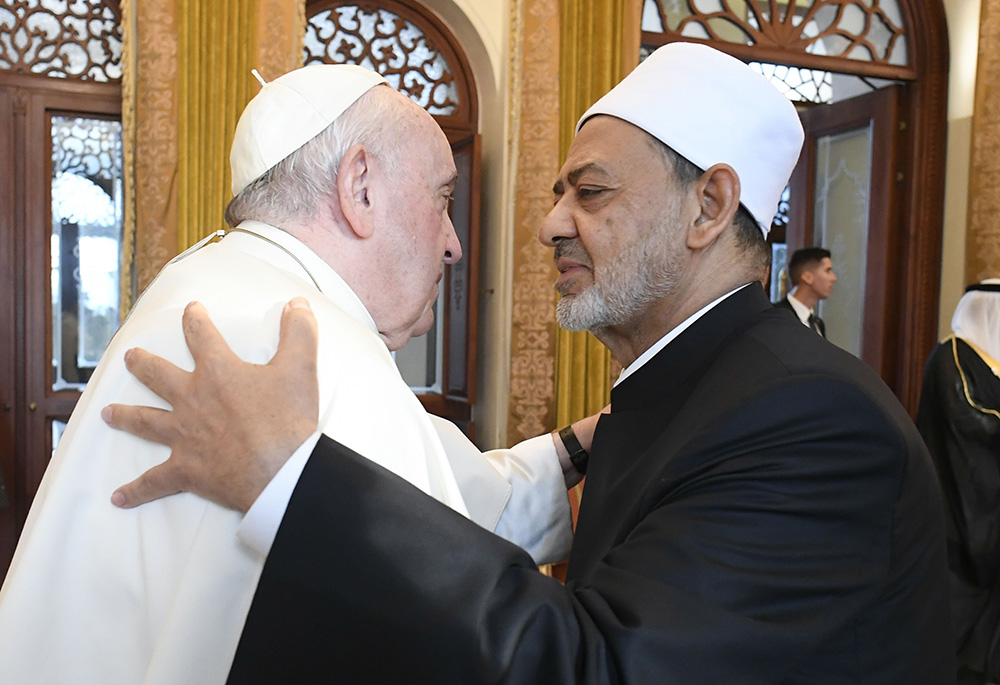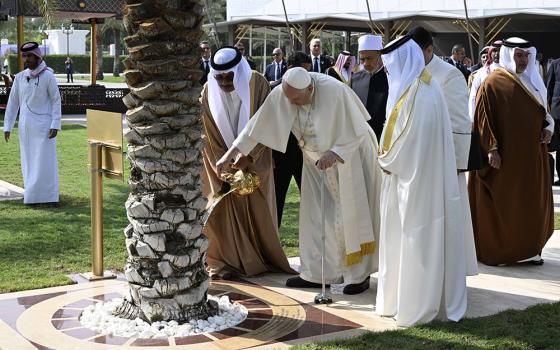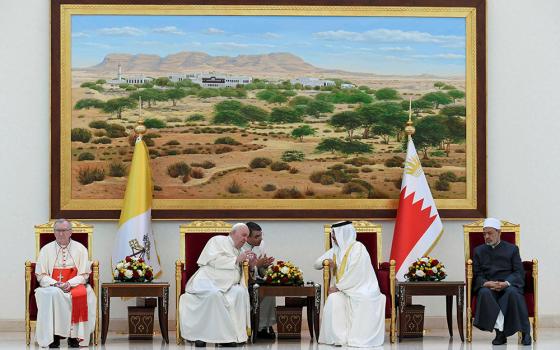
Pope Francis greets Sheikh Ahmad el-Tayeb, grand imam of Egypt's Al-Azhar mosque and university, at Sakhir Royal Palace Nov. 4, 2022, in Awali, Bahrain. (CNS/Vatican Media)
The top cleric of one of the two long-divided branches of global Islam has called for Sunni and Shia Muslim leaders to meet together in a joint dialogue, using Pope Francis' visit to the Persian Gulf nation of Bahrain as an occasion to suggest what could be a first-of-its-kind historic summit.
Grand Imam Ahmad el-Tayeb — a Sunni and former president of Egypt's Al-Azhar university, considered the most authoritative theological institution in Sunni Islam – made the appeal on Nov. 4, during the closing session of the "Bahrain Forum for Dialogue: East and West for Human Coexistence."
Sunni and Shiite are the two major branches of Islam. They split in the 7th century and have different traditions of religious practice, and tensions between the communities have sometimes led to violent conflict in a number of Middle East countries.
El-Tayeb, speaking the same day as Francis at the Bahrain conference, made a special appeal to his Shiite brothers, along with other sects of Islam, to come together with "open hearts and extended hands" in order "to put aside our differences and strengthen our Islamic unity."
Islamic law, he noted, "prohibits Muslims from giving in to calls for division and fragmentation."
A summit of the world's Islamic scholars and clerics "from every sect and school of thought," said el-Tayeb, would provide an occasion for "dialogue around unity, cohesion and rapprochement, a dialogue for Islamic fraternity, void of division, discord and, more especially, sectarian strife."
Ahmed Barakat, director of communications for Al-Azhar, told NCR it marked the first occasion that el-Tayeb had made such a proposal in a public forum, having only done so in previous private encounters.
Francis and el-Tayeb have been close collaborators in Muslim-Catholic dialogue since 2017. In 2019, they both signed a landmark document on "Human Fraternity for World Peace and Living Together," widely heralded as a major advancement in the Catholic Church's relationship with the Muslim world.
Advertisement
While most of Francis' engagement with the Muslim world has been with Sunnis, his trip to Bahrain was viewed as an occasion to further engage Shiites.
Yet in Bahrain, which is majority Shiite but ruled by Sunni Muslims, the tensions between the two branches of Islam have been brought into sharp focus, with leading human rights groups charging the Sunni leadership with widespread discrimination against the country's Shiites.
In his speech, el-Tayeb urged Sunni and Shiite leaders to "focus on commonalities and meeting points, with an understanding of differences."
"Let us together chase away any talk of hate, provocation and excommunication and set aside ancient and modern conflict in all its forms and with all its negative offshoots," the grand imam said.
Following el-Tayeb's remarks, Barakat said in an interview that the grand imam's invitation was "historic," as it represented the first time the religious leader had used such a forum to propose such a dialogue.
Barakat said that for centuries, the two groups have lived alongside each other harmoniously, lamenting the fact that politics has corrupted those relations.
El-Tayeb, the spokesman noted, is a leader "open dialogue," enjoying strong relations with the Vatican and the Anglican Church.
"But now it's a time for opening a dialogue with other Muslim schools of thought," he said. "It's two lines."
Following el-Tayeb's remarks, Anthony Cirelli, who serves as the associate director of the U.S. bishops' office of ecumenical and interreligious affairs, told NCR via email that while it's hard to speculate on exactly why such a dialogue was proposed, "one might reasonably assume el-Tayeb is applying the notion of fraternitas, which ostensibly grew out of his encounter with the pope, towards the healing of the Muslim world."
Cirelli added that on the surface, "such an invitation looks to be a tremendous attempt at what many have thought (and no doubt think) impossible."
In the afternoon of Nov. 4, following the conclusion of the interfaith summit, Francis held a private meeting with el-Tayeb, where he praised the imam's call for dialogue between Muslims as "very courageous."
Following their one-on-one encounter, the pope met with the Muslim Council of Elders, an international organization that the grand imam chairs. Inside the mosque of the Sakhir Royal Palace, Francis used his remarks to underscore the importance of human encounters in the efforts of peace building.
"We need to encounter one another, to get to know and to esteem one another, to put reality ahead of ideas and people ahead of opinions, openness to heaven ahead of differences on earth," he said. "We need to put a future of fraternity ahead of a past of antagonism, overcoming historical prejudices and misunderstandings in the name of the One who is the source of peace."
"We must be exemplary models of what we preach, not only in our communities and in our homes — for this is no longer enough — but also before a world now unified and globalized," he told them.
Following his address to the Muslim elders, Francis is scheduled to visit the largest Catholic cathedral in the Persian Gulf for an ecumenical prayer service. On Nov. 5, he is to celebrate an outdoor Mass for an estimated 20,000 Catholics from throughout the region.






